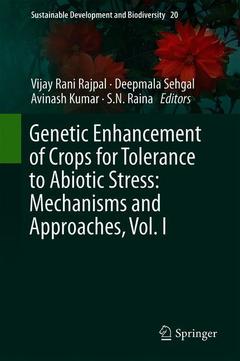Description
Genetic Enhancement of Crops for Tolerance to Abiotic Stress: Mechanisms and Approaches, Vol. I, 1st ed. 2019
Sustainable Development and Biodiversity Series, Vol. 20
Coordinators: Rajpal Vijay Rani, Sehgal Deepmala, Kumar Avinash, Raina S.N.
Language: English
Subjects for Genetic Enhancement of Crops for Tolerance to Abiotic...:
268 p. · 15.5x23.5 cm · Hardback
Description
/li>Contents
/li>Comment
/li>
Abiotic stresses such as drought (water deficit), extreme temperatures (cold, frost and heat), salinity (sodicity) and mineral (metal and metalloid) toxicity limit productivity of crop plants worldwide and are big threats to global food security. With worsening climate change scenarios, these stresses will further increase in intensity and frequency. Improving tolerance to abiotic stresses, therefore, has become a major objective in crop breeding programs. A lot of research has been conducted on the regulatory mechanisms, signaling pathways governing these abiotic stresses, and cross talk among them in various model and non-model species. Also, various ?omics? platforms have been utilized to unravel the candidate genes underpinning various abiotic stresses, which have increased our understanding of the tolerance mechanisms at structural, physiological, transcriptional and molecular level. Further, a wealth of information has been generated on the role of chromatin assembly and its remodeling under stress and on the epigenetic dynamics via histones modifications.
The book consolidates outlooks, perspectives and updates on the research conducted by scientists in the abovementioned areas. The information covered in this book will therefore interest workers in all areas of plant sciences. The results presented on multiple crops will be useful to scientists in building strategies to counter these stresses in plants. In addition, students who are beginners in the areas of abiotic stress tolerance will find this book handy to clear their concepts and to get an update on the research conducted in various crops at one place
Provides up to date comprehensive information on the key biological determinants of plant abiotic stresses with an emphasis on modern crop improvement strategies
Is unique to combine the responses triggered in plants by various abiotic stresses, stress resistance mechanisms, changes in gene expression, regulation of stress tolerance mechanisms, generation of genomic resources and their utilizaion for QTL and association mapping, marker assisted and genomic selection, among others, for developing abiotic stress-tolerant crop varieties
Chapters written by world authorities of their subject
No competitive book available in this format




